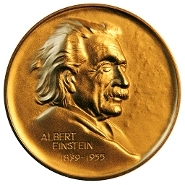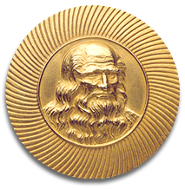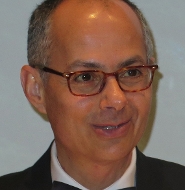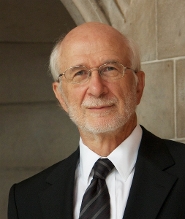Awards
As a venue, Leiden University is a fitting setting for recognising the outstanding achievements of the award winners and celebrating the inspiration that they bring as role models for encouraging a fairer society by motivating one individual at a time.
Science

Professor Omar M. Yaghi, the James and Neeltje Tretter Chair Professor of Chemistry, University of California-Berkeley, USA, has been selected as the winner of the 2017 Albert Einstein World Award of Science.
The prize is awarded for his ground-breaking scientific contributions in making materials by stitching organic and inorganic units through strong bonds into robust, porous crystalline metal-organic frameworks (MOFs) and covalent organic frameworks (COFs), and for establishing a new field of chemistry – Reticular Chemistry.
These original accomplishments, both theoretical and experimental, have spurred the creation of new fields of chemistry, developing new materials for application in clean energy, hydrocarbon separation, clean water production, catalysis and more recently electronics.
The World Cultural Council acknowledges Prof. Yaghi’s leadership in research and mentoring emerging scholars in multiple countries around the world, along with his commitment to developing innovative solutions to problems that threaten world sustainability. Not only is this a precious service to mankind but it also inspires future generations.
Arts

The 2017 Leonardo da Vinci World Award of Arts will be granted to Professor Russell Hartenberger, Professor Emeritus of Ethnomusicology and Percussion, and former Dean of the Faculty of Music, University of Toronto, Canada.
This recognition is for his lifetime commitment to cultivating and shaping our understanding of music and performance across cultures and genres, respecting the diversity of world traditions, besides his visionary and seminal contributions to percussion and contemporary music.
It is a prize granted to Prof. Hartenberger for his achievements as a scholarly writer, as well as an extraordinarily talented percussionist, and for his commitment to teaching and inspiring new generations of young musicians and scholars. In the words of Evelyn Glennie: “…his knowledge, constant curiosity and dedication to all he does and everyone he meets always means that you are a better person for having been in his presence.”
Winners’ Achievements
Read more about Professor Omar M. Yaghi
Professor Omar M. Yaghi

Omar Yaghi was born (February 9, 1965) and raised in Amman, Jordan. In third grade, he had an experience that would profoundly impact his life. One lunch break, he slipped into the school library and came across drawings of molecules, mysterious yet beautiful to him. Reflecting on the meaning of this discovery, he felt there was a wonderful secret held within him that he could not yet fully understand.
At the age of 15, Omar left Jordan for the USA. He received his BSc from State University of New York-Albany in 1985 and PhD from the University of Illinois-Urbana in 1990, before working as a NSF Postdoctoral Fellow at Harvard (1990-92). He has been on the faculties of Arizona State University, University of Michigan, and UCLA. He is currently the James and Neeltje Tretter Chair Professor of Chemistry at UC Berkeley and a Senior Faculty Scientist at Lawrence Berkeley National Laboratory. He is also the Founding Director of the Berkeley Global Science Institute, and Co-Director of both the Kavli Energy NanoScience Institute and the California Research Alliance by BASF.
Prof. Yaghi is noted for his contribution in introducing metal-oxide clusters as anchors for joining organic linkers into robust crystalline open frameworks with permanent porosity. These new metal-organic frameworks (MOFs) are numbered roughly in their chronological order of discovery. MOF-2 (reported in 1998) was the first MOF to exhibit a Type-I gas adsorption isotherm at low pressure and low temperature, the gold standard for proving that gases can move in and out of frameworks without structural collapse, thus proving their permanent porosity and opening the way for practical applications in gas storage and separations, including carbon dioxide capture and conversion to fuels. Such frameworks are useful for making our world sustainable with great short and long-term benefits.
Professor Yaghi broke the historic world record of porosity in 1999 by developing MOF-5 and its congeners reaching the highest surface area: 6,500 m2 /g. From 2000-2010, he was listed among the two most highly cited chemists worldwide (Thomas Reuters, February 10, 2011). He has won national and international awards including the: 2004 Sacconi Medal, Italian Chemical Society, Inorganic Chemistry Division; 2007 Materials Research Society Medal (Sole Recipient); 2009 American Chemical Society Award in the Chemistry of Materials; 2010 Royal Society of Chemistry Centenary Prize; 2015 King Faisal International Prize in Science; 2017 Royal Society of Chemistry Spiers Award, and 2017 King Abdullah II Order of Distinction of the First Class, among many others.
Prof. Yaghi is keen to foster science in other countries. He has founded several research centres in Vietnam, Korea, Japan, Jordan and Saudi Arabia, providing opportunities for young local researchers.
Omar Yaghi now understands the power of those molecular drawings in his school library. They have led him to make major breakthroughs and create new fields of research. His discoveries over the last 25 years have given rise to an explosive growth in materials chemistry with major impact worldwide.
Read more about Professor Russell Hartenberger
Professor Russell Hartenberger

Prof. Russell Hartenberger is considered as a musical visionary and one of the most prominent figures in percussion history. He is a member of Nexus and has been a member of the Steve Reich and Musicians Ensemble since 1971.
He received his B.Mus. degree in 1966 from Curtis Institute of Music, where he studied with Fred D. Hinger; and his M. Mus. in 1969 from the Catholic University. He gained his PhD in 1974 in World Music from Wesleyan University, venturing into a range of instruments, including the mridangam with Ramnad Raghavan of South India, the tabla with Sharda Sahai of North India, Javanese Gamelan with Prawotosaputro, and West African drumming with Abraham Adzinyah.
Russell Hartenberger is a virtuoso soloist whose technical mastery encompasses virtually every percussion instrument imaginable. He has dedicated most of his performing and creative energies to collaborative participations with others, musicians and non-musicians, promoting world understanding among musicians and audiences alike.
He has focused especially on the dissemination of multiple world music styles, practices of improvisation and most famously, creation, performance and scholarship in the musical tradition of minimalism.
His name has become synonymous with brilliance in percussion playing, rigorous musical scholarship on percussion and musical minimalism, and the championing of musical stylistic diversity and intercultural exchange through musical performance.
Professor Hartenberger has performed throughout the world, including appearances with the New York Philharmonic, Boston Symphony, Cleveland Orchestra, London Symphony, Israel Philharmonic, Cologne Radio Orchestra, Toronto Symphony, BBC Orchestra, New Japan Philharmonic, the Marlboro Music Festival under Pablo Casals and other leading orchestras in Europe, Asia and North America. He has appeared on over 70 recordings for various labels including Nonesuch, ECM, DGG, Sony, Phillips and Nexus.
Russell Hartenberger’s pledge to demonstrating and performing the fundamental human experience of time through collaborative, cross-cultural percussive performance and improvisation expresses a vision of human reaching audiences all over the world. His work has been an exceptional vehicle for fostering the kind of societal-cultural understanding and fraternity that contributes fundamentally to the betterment of the world and its human legacy.
This year the WCC’s 34th Award Ceremony will take place on Wednesday 8th November 2017 at 15:00 hrs. in Leiden University, the Netherlands.
As part of the programme, the World Cultural Council, in cooperation with the host institution, organizes a distinguished lecture by each award winner, providing an opportunity for interaction between the university community and the laureate. These lectures will take place on the morning of Wednesday 8th November.
During this event, the World Cultural Council grants special acknowledgements to young researchers or scholars of the host country who have achieved outstanding performance in the fields of science, education or arts. This year nine promising young female research leaders from Leiden University will be recognised.
For further details on the programme please see the Programme.
Since 1984 the WCC has held a yearly Award Ceremony, granting prizes to outstanding scientists, educators and artists whose breakthroughs in the fields of knowledge, learning and research have contributed positively to the cultural enrichment of mankind.
Each ceremony is held in a different country with a renowned university or academic institute acting as host. The WCC and Leiden University are enthusiastic about this new partnership. It offers the opportunity to jointly disseminate our many shared values including 1) excellence as a guiding principle in research, innovation and higher education, 2) inspiring future generations by recognizing extraordinary individuals and achievements, and 3) embracing a vision of diversity and mutual respect towards a better world.
As a venue, Leiden University is a fitting setting for recognizing the outstanding achievements of the awardees and celebrating the inspiration that they bring as role models for encouraging a fairer society by motivating one individual at a time.
The annual Albert Einstein World Award of Science was created as a recognition for scientists who have accomplished scientific and technological achievements which have brought progress to science and benefit to mankind. The laureate is selected by the Council’s Interdisciplinary Committee, which comprises of highly acknowledged scientists from across the globe.
The Leonardo da Vinci World Award of Arts was instituted as a means of acknowledging a renowned artist, outstanding figure or innovator in any discipline or expression of art, whose work constitutes a significant contribution to the artistic legacy of the world. The distinction of these awards is substantiated by the world-renowned authorities from a variety of fields comprising the multidisciplinary jury.

